I Don’t Care About Your Brand
Nex Benedict, Taylor Lorenz, and why trans trauma is not your goldmine.
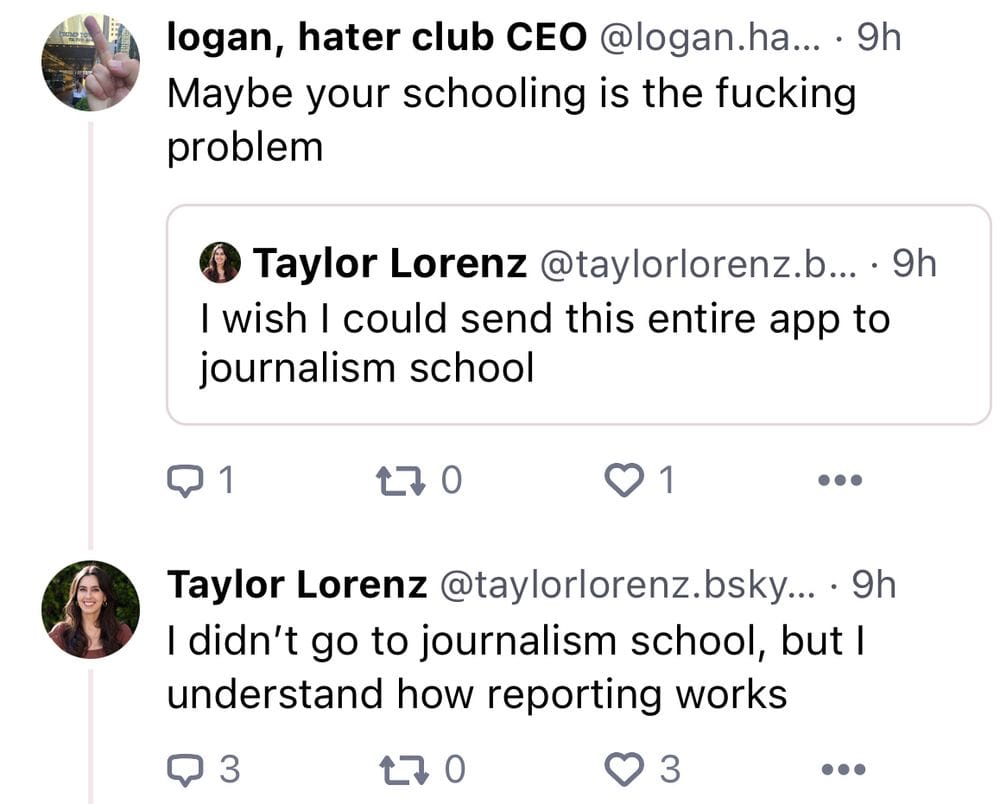
For decades now, trans people have been educating cis people on how to cover our community. It has been slow, painful, thankless, often unpaid work, but until this week, I was under the impression that most liberal and progressive commentators knew the basics: Use chosen names and pronouns. Don’t out anybody. Someone doesn’t “identify as” their gender, they are their gender. Etcetera. The Trans Journalists Association has put out an entire style guide, which is available for free online, and its really quite reasonable recommendations are, or should be, known to any half-decent reporter who covers this beat.
Apparently, an entire style guide wasn’t enough. Apparently, I now have to add another guideline, one which seems like it should have been obvious: Don’t be a fucking ambulance chaser. When trans trauma and trans death are in the news — and they very often are — then you, as a cis person, must not use this as an excuse to go viral, create splashy controversy, spin a narrative that centers on your own Bravery and Goodness for Caring, or otherwise use it to enhance your brand.
Furthermore, and in particular: If you are going to use a trans person’s violent death as a narcissistic exercise, and exploit the suffering of a real trans person to raise your own cis profile (and we’ve established that you should not be doing this) then, at the very least, do not do it at the explicit request of the right-wing hatemonger whose work just killed that trans person, who you have for some Godforsaken reason chosen to give more attention, focus and publicity than any actual trans person, up to and including the child they quite recently killed.
Yes: We have to talk about Taylor Lorenz. I’m sorry, not least because “people talking about Taylor Lorenz” is literally the only thing Taylor Lorenz seems to want.
Taylor Lorenz is a reporter who covers “Internet culture.” She decided, for reasons unknown to me, that this qualified her to write an article on the hate-crime death of 16-year-old Nex Benedict, a trans student who was brutally beaten in his own school bathroom and died the next day. In particular — and this part is to her credit — Lorenz decided to interview other trans kids in Benedict’s school district about how the current climate of anti-trans hatred was affecting them.
You could absolutely write a good version of that article. I know this, because good reporters have already done it. Here’s an article by Kate Sosin and Nadra Nittle at The 19th, which substantially predates Lorenz’s attempt. Here’s an even better article by Jo Yurcaba at NBC News, which actually surfaces new information: Benedict primarily used he/him pronouns, not they/them, as was reported earlier. Early reports said that Benedict died as the result of head trauma — his head was smashed repeatedly into the floor of the school bathroom by his attackers — and police reports denied trauma as the cause of death, leading many to suspect a cover-up. That’s still very possible, but some of Benedict’s friends believe that he may have died by suicide as the result of prolonged bullying.
How did Yurcaba manage to get that information? Well, for one thing, they actually asked about Nex Benedict. The child who died is the explicit focus of the article about that child’s death. Yurcaba (like Sosin) is trans, and has a background in reporting on gender, which led to them to ask pertinent questions that cis reporters still apparently don’t think of, like whether the pronouns being used for Nex were accurate. Finally, the vast majority of the people quoted in Yurcaba’s article are actual trans kids — whose identities Yurcaba protects, out of respect for their extreme vulnerability — so that the news of a trans death is reported through the lens of the community that mourns that child, and the people who share in his oppression.
That is how you do this. That is how trans people have generously, patiently instructed cis people to do this. I refer you to the TJA Style Guide, specifically the opening section entitled “Editorial Best Practices,” wherein the very first sentence is: "Trans people — not their parents, children, friends, colleagues, or critics — should be at the heart of stories written about them."
Following up on this, for the denser readers, is one of very first instructions, in bold type: Talk to trans people about trans people. “When reporting a story about trans issues, reporters should interview trans people who have knowledge, experience, and expertise about the topic,” says the TJA. “Trans people’s voices should be centered in this coverage; they should speak, not just be spoken about.”
I want you to pay particular attention to that word: Centered. Trans people should not just be included; they should not just be quoted; they should not just be covered; they should be centered, made the explicit focus of the piece. Trans people must always be the point of trans coverage, anything else further re-entrenches our marginalization and sends the message that cis people are both more important and better qualified to talk about our lives than we are.
Transphobic bigots should not be centered in trans coverage. Cis reporters should not be centered in their own coverage of trans issues. I want you to be absolutely clear on that part. Because, now that we’ve talked about what good trans coverage looks like, and how you’re supposed to do it, we can talk about what Taylor Lorenz did.
Because Taylor Lorenz is an “Internet culture” reporter, and not a reporter on trans issues, she decided to center her piece on Chaya Raichik, AKA LibsofTikTok, a popular social media account that practices stochastic terrorism in the form of pointing out specific queer people and places (say, children’s hospitals that provide gender-affirming treatment) to her fan base of Nazis. Death threats, bomb threats, and harassment campaigns inevitably follow.
There is a tie-in here, in that Nex Benedict’s school had previously been targeted by Raichik, thus amplifying the atmosphere of transphobia. However, the students at Nex’s school point to multiple other factors, including racism (Nex was indigenous) and the school’s unwillingness to reinforce its own bullying policies, which had already led to trans, queer and/or BIPOC students being pulled out of school and forced to attend online classes for their own safety. We can also point to a whole climate of moral panic surrounding trans kids, including an onslaught of anti-trans legislation. Oklahoma state superintendent for education Ryan Walters made campaigning against trans children a major part of his platform, and in June of 2023, he released a video claiming that trans students in girls’ bathrooms (which is where Nex Benedict was attacked) were “dangerous.”
Raichik is part of the story; Raichik is not the center of the story. Nex Benedict is the center of the story, and so are trans kids. Yet Lorenz evidently feels she’s been bullied by Raichik, and has had previous run-ins with her, so she focused on Raichik to the point that she felt compelled to interview her.
To be clear: Bad actors are typically called to comment on allegations, for ethical and legal reasons. However, if you’ve already done a decent job of reporting on this person’s wrongdoing, you will have assembled all the corroboration you need prior to reaching out. All you need to do, and all you are ethically obliged to give them, is a quick “how do you respond to the allegations” email; they’ll stonewall or send a canned statement, and you print either “X denies” or “X did not respond by press time.” If your piece doesn’t center the perpetrator, a lengthy interview is unnecessary — the facts already speak for themselves.
Lorenz was nominally “asking for comment” in this way when she reached out to Raichik. However, when Raichik demanded an in-person meeting, Lorenz agreed. When Raichik said the interview would take no longer than five minutes, Lorenz believed her. When Raichik showed up with her own personal camera crew, ready to film the encounter, Lorenz sat down and let them film. When Raichik proceeded to speak for fifty-three straight minutes to an unprepared Lorenz, then gave the video to Lorenz (twice, according to Poynter) with the expectation that Lorenz would share it on her social media channels, Lorenz put the full thing up, right away, without ever once considering that she had been played for a sucker.
Of all the things you’re going to hear about that video, here’s the most important one: The name “Nex Benedict” doesn’t come up for twenty minutes and eight seconds. Twenty-one minutes and ten seconds into the video, Lorenz has moved on to talking about something else.
One minute, two seconds. That is the worth of a trans child. One minute, two seconds, out of fifty-three minutes and fourteen seconds: That is the time Taylor Lorenz could spare to think about Nex, talk about Nex, before she just. Moved. On.
But the article! You haven’t even talked about Lorenz’s article! No, I haven’t. By the time Lorenz had allowed Chaya Raichik to dictate the terms of her own coverage, and collaborated with her in producing custom video content for her YouTube channel, the article was beside the point. Raichik had already successfully turned Benedict’s death into a promotional opportunity: Raichik’s follower numbers went up substantially after Lorenz posted the interview, and clips posted by right-wing influencers have garnered over 703,000 views on Twitter, substantially more than anything Lorenz has posted.
Lorenz’s article was fine, I suppose, by which I mean that it wedges a few quotes by trans people in at the very end, and that it was a half-hearted rehash of reporting that had already been done better by trans journalists. The few trans people Lorenz did quote were quoted carelessly, in a way that betrayed her fundamental lack of knowledge or investment: Raichik got a full interview, but Nex Benedict’s parents are not quoted. At one point, Lorenz directly endangered a trans high school student by printing both his full name and the name of his high school, before someone evidently noticed and redacted the school name. (In conversation with me, Lorenz denied that the school’s name was ever given, and then — in response to screen shots showing that it had been — claimed that her editor had done it without her knowledge. If this is true, Lorenz herself doesn’t appear to remember what she wrote, and may not have even read it before publication, which is one clear indication of how much she cares.)
The article is perfunctory, and it is also paywalled, and thereby limited in reach. This makes it very much unlike the video interview, which Lorenz has taken every possible opportunity to share on every social media channel. Lorenz herself understands that the article is a footnote; the story here is not about Nex Benedict, not about trans children, but about Taylor Lorenz, the stunning and brave cis journalist who just cares so darn much about trans people that she’ll even sit down with her personal bully.
Writing about trans people, quoting trans people, was never the point here: The point was always the video, because the point was to produce another fascinating episode in the life of Taylor Lorenz, Fearless Girl Reporter. That is why Lorenz exhibited absolutely no skepticism or reasonable caution in allowing Raichik to set the terms here: She was excited. Lorenz instinctively understood that this was a good stunt, and that it would net more exposure for the both of them. Lorenz, being an “Internet culture” reporter and not a reporter on trans issues, was not primarily concerned with the death of Nex Benedict. She did not want to produce some boring article about school bullying policies. She wanted something clicky and buzzy and viral that had her face on it. She wanted us to talk about how brave she is for caring about those poor pathetic little trans people who could never possibly speak for themselves.
And when those trans people turned out to have voices, and concerns about her reporting, Taylor Lorenz dropped the mask and started screaming at them and calling them stupid.
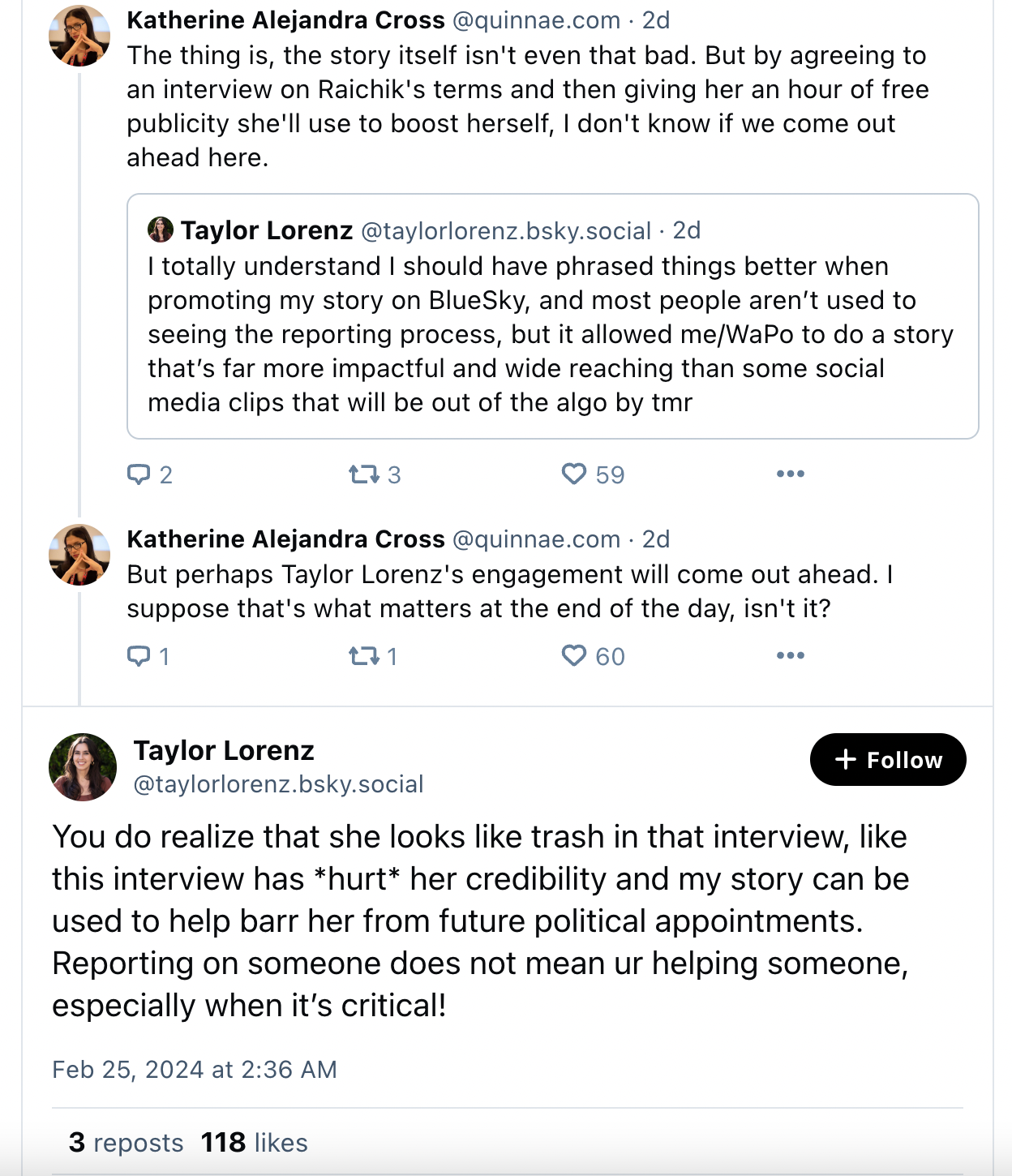
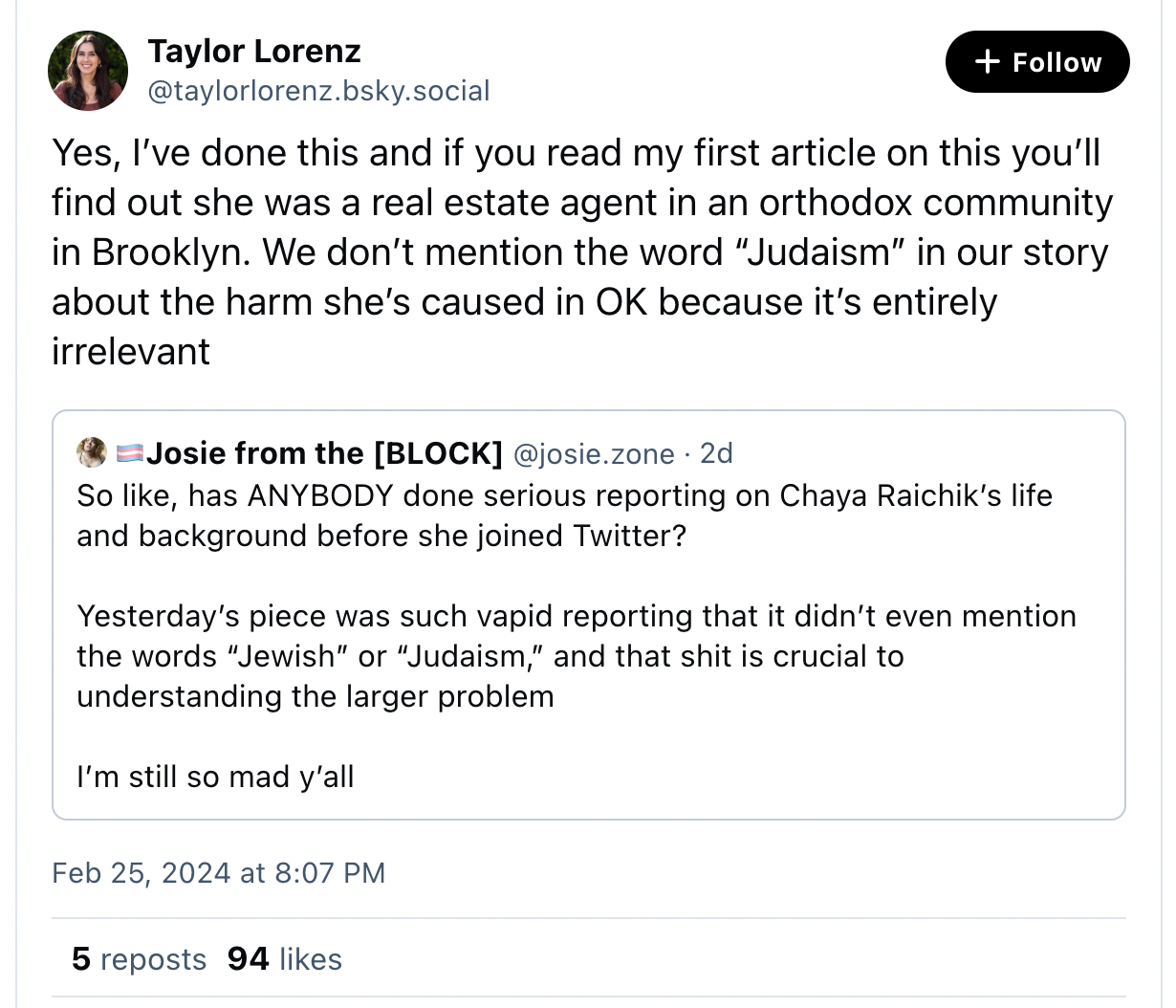
Immediately after the video interview dropped, and the trans community began to react, Taylor Lorenz’s timeline began to fill up posts in which Lorenz confronted and scolded trans people — usually trans women — that she had deemed insufficiently appreciative. I'm choosing these two screenshots, out of many, because both of the trans femmes that Lorenz scolds above are professional journalists. Abraham Josephine Riesman has written an NYT-bestselling book, and has freelanced for a long list of legacy media outlets, including The Washington Post, where Lorenz works. Katherine Cross is a digital humanities scholar studying the spread of hatred in digital and social media, a subject on which she is a renowned expert; she's contributed to The Verge and Wired, and her book on the subject is forthcoming. I’m no-one in particular, but I do cover trans stuff, and I can confirm that Lorenz was insufferable and condescending to me as well:
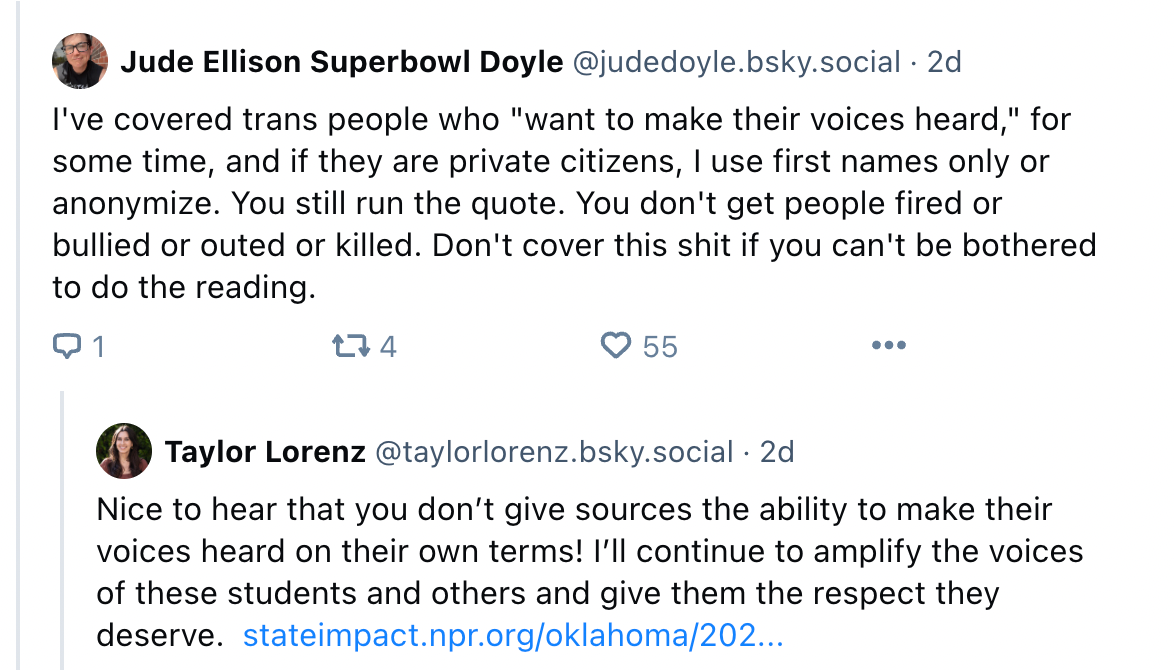
When you understand the actual beats and expertise of her critics — and I’m not clear whether Lorenz does — then you begin to see why it was alarming that, upon losing these arguments, she immediately began to post stuff like this.
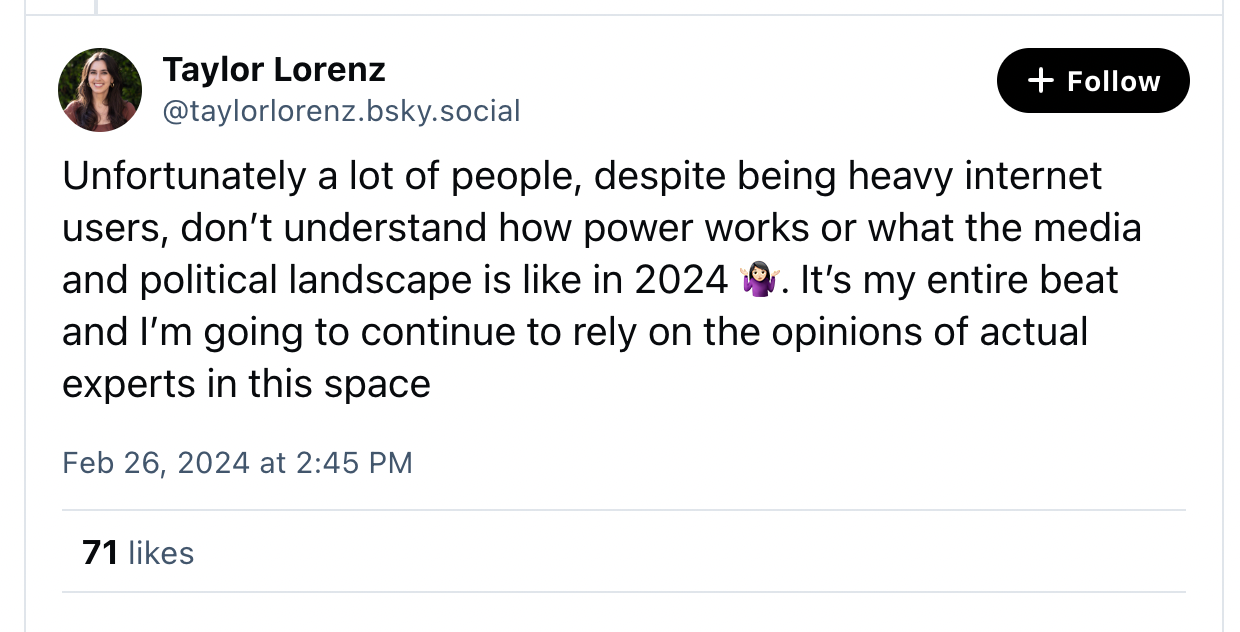
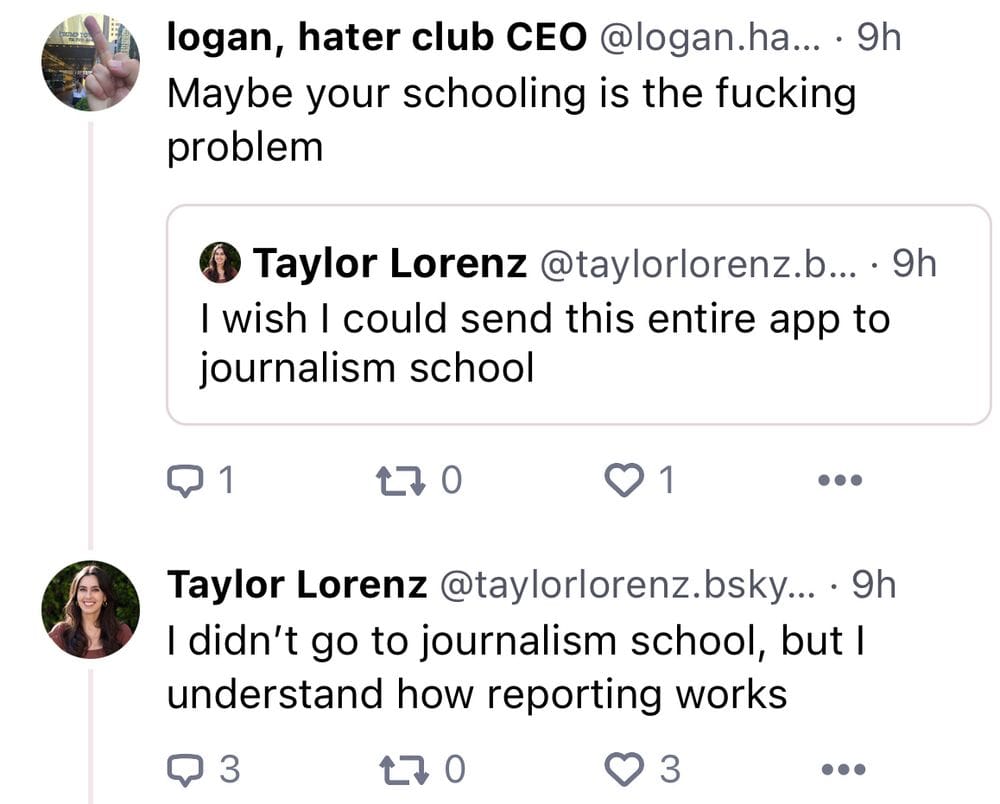
This was a reporter doing work well outside of her established beat, who made several basic errors (in the article — the “error” of the video, as we’ve discussed, was clearly intentional) and who then angrily started scolding the reporters with actual experience on that beat when they pointed it out. If this doesn’t seem like profound and disqualifying ignorance to you, or if you didn’t notice — and many of Lorenz’s cis colleagues, who are circling the wagons for her as we speak, did not — it’s entirely because Lorenz is cis and her critics are trans. The fact of being cis gives her license to speak over trans people, and assume the mantle of an expertise she obviously does not possess, even when the subject is the beat those trans critics cover for a living, or when the problem is the ongoing threat to their own lives.
Chaya and Taylor, the “ally” and the “enemy,” represented two sides of the same baseline contempt for trans people. Both of them were equally determined to make sure that trans people did not become the focus of this story. Neither of them believed that trans people ought to be allowed to speak for themselves. Taylor Lorenz is not Chaya Raichik’s adversary. She is her collaborator, in a very successful joint project. Both of them set out to make bank and boost their brands on the back of a dead fucking kid.
So, no. I don’t think I will be talking much about the article. I will be talking about Taylor Lorenz, because that’s evidently the only thing Taylor Lorenz actually cares about. Now I have to care, too. I have to do what we always do: I have to educate you, on why it’s not okay to call trans people stupid when you’re “helping” us, or why it’s in bad taste to engineer a publicity stunt off our dead, or why — for fuck’s sake — the still-unexplained death of a child who got bullied and beaten and killed a week ago matters more than Taylor Lorenz getting mean comments on the Internet, and why you simply shouldn’t cover that child, or his death, unless you’re prepared to make him your exclusive focus. I have to explain that the number one rule of writing about Nex Benedict is that Nex Benedict matters more than you.
I have to remind you that reporting is nominally a profession of service, and that reporting on a marginalized community means undertaking the job of serving that community — not dictating the terms of the “help” you think they need, but actually, actively working with them to build trust, understand their needs, and reflect that in your coverage. I have to point out that the one thing trans people need most is truth; we have been subject to such overwhelming cultural erasure and misinformation that even I, a trans person who covers trans issues, am still making mistakes and learning things I didn’t know. I have to point out that the arrogance and flagrant, unapologetic mediocrity Taylor Lorenz has displayed throughout this mess only adds insult to injury, in that there are so many trans people with so much more skill who could have done this job, and she not only fucked it up, she’s actually angry at the idea that she could have done better.
I have to bite my tongue, because if I tell you what I really think of this woman, I’m going to say some things I regret. What I really want to say is that she’s either somebody’s kid or she helped someone bury a body, because there’s no way in hell she got this job based on the quality of her work, and that I have honestly never seen someone so obviously unintelligent be given such unearned credence by journalists who supposedly know better. What I really want to say is that I thought, based on her behavior, that Taylor Lorenz was some kid fresh out of college who didn’t know any better, and I Googled her, and I found out that she’s my age, and what I really want to say is that it nauseates me that a fully middle-aged cis person can assign herself the work of reporting on a hate crime and then collapse into tears and tantrums like a four-year-old when she publicly shits the bed and then, somehow, still have a job afterward, because if this was one of us, we’d be fucking fired or we’d never make it through the door.
I want to say all that, but let’s pretend I didn’t, because we all know that if a trans person responds to insult with anger, their testimony will be dismissed. What I don’t want to tell you about is the grief. I don’t want to tell you that when I saw Nex Benedict’s face come up on my timeline, my breathing stopped for a second, and I am not really sure that it’s started since. I don’t want to tell you — because you won’t care — that when I looked into his eyes, every bad moment I had in a school changing room or bathroom or hallway came roaring up out of the basement in my mind where I normally keep it, and I remembered that when I was fifteen years old, my favorite teachers called my mother and begged her to remove me from school because they were pretty sure I wouldn’t survive until graduation, and I saw what my sixteenth year would have looked like if she hadn’t listened, and I had, for one ridiculous moment, the feeling that I had just watched myself die.
I feel like I’m having that dream where you attend your own funeral, and what I’m realizing is that if my fellow students had successfully killed me, no-one would have actually cared. There would be some stories, maybe, and a vigil, and then some cis woman with a personal brand and a poli sci degree would waltz into the fucking wake and shove her way onto the camera and find a way to make the whole thing about herself, and that would be what people cared about. That would go viral. One minute, two seconds. That’s what Nex Benedict was worth. That’s all that any of us are actually worth to the world. That is what I feel.
I don’t think you should be allowed to cover this story unless you feel that grief. I just don’t. I don’t think you should write about dead trans kids unless you care about dead trans kids more than you care about your career or your byline or your brand. And I think that if you try, if you walk into a crowd of grieving people and demand that all of them validate how great and brave you are for almost sort of caring, you are going to get your ass handed to you, and it will be fully deserved.
Because: If this is how I feel, if I’m fucking destroyed, and I’m just some guy on the other side of the country who happened to read about it, how must his family feel? How must his friends feel, his exes, the people who had crushes on him? How must the other trans student who got attacked in that bathroom — because Nex got assaulted alongside another trans kid; he died, the other kid didn’t, and that child, more than anyone, has the right to feel that they are watching the culture pass a verdict on their own life and death — feel about all this?
You don't have to wonder. You can ask. You can do some fucking halfway decent reporting. I hate to tell you this, but I already know what Chaya Raichik thinks about trans people. I know it because she talks about it, constantly, on her extremely large public platform. I know all about what transphobia sounds like, because I never fucking stop hearing it, from legislators and influencers and presidential candidates and the editorial board of the New York Times; I don’t need anyone to “expose” or “shine a light” on all the hatred I never stop seeing. What the world hasn’t seen yet — what the world needs to see, needs to hear — is us, and what we’re going through. It needs our humanity. It needs our voices.
We have been giving you those voices, and what I am learning is that you do not want to hear them. You want a story, a hero, a villain, a click, a controversy. We live and die in the spaces between the words.